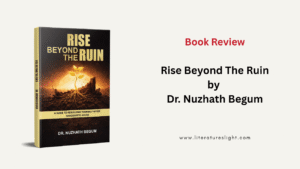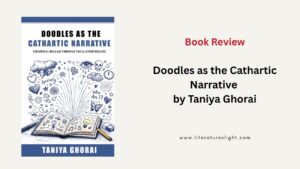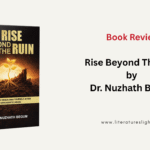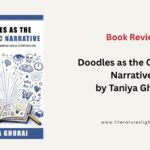Biographical Info: Udit Kapoor is a freelance writer. He was born on October 30th, 1984 and he currently lives in Seoni (MP), India. His personal experience of mental stress encouraged him to write a book on the subject. Udit Kapoor (B.E. M.B.A.) is a Mechanical engineer that is highly engaged in his own business. “STRESS TO HAPPINESS” is his first book published by Kindle Direct Publishing, Bigfoot Publication India and Lulu Publication U.S.A.
The book is available in German, French and Italian Languages exclusively on Amazon. “MEDITATION FOR EFFORTLESS SLEEP” is his second valuable eBook with kindle. Presently, he is evaluating various environmental factors affecting human behavior, in the near future; this may take shape of a valuable book for the remedies.
Interviewer: Many congratulations on your wonderful book “STRESS TO HAPPINESS”, Mr Udit Kapoor Ji! What response are you getting on your maiden work from the readers? Please share your experience with us.
Udit Kapoor: Thanks, Honestly! Everyone who wants to be a writer imagines the day they’ll finally hold their finished book in their hands. Part of you believes it will never happen. So when that day finally arrives it’s a strange feeling. “STRESS TO HAPPINESS” is my first book, Initially Self published with Kindle Direct publishing and later with Bigfoot Publications India and Lulu publications U.S.A. This book is also available in Italian, French, German and Spanish languages exclusively on Amazon. The book is getting a very good response all over the world. It feels so good whenever I get emails from my readers around the globe.
Interviewer: Aside from the book, “STRESS TO HAPPINESS” , please tell readers about your interest in literature. Furthermore,do you think someone could become a celebrated writer if they don’t have strong emotions?
Udit Kapoor: I think my literary aspirations began when I was about 13-14 years old, I had been writing diaries, reading books but seldom read fiction. My favorite niche is self-help, so almost everything I read is non-fiction – self-help.
One incident in my life inspired me to write a book on stress and meditation. I was undergoing mental stress due to some personal problems in2009; as a result I became afflicted with deep depression. Then it got to a point that I said to myself, “Udit, you can’t continue like this.” So, I started practicing meditation, I began to feel a magical change in my thoughts in the early days and with regular practice of meditation, I completely defeated my depression and now living a stress-free and happy life.
I think emotion is very important in writing. Emotion is the key that can be used to unlock the door to reader engagement. In the absence of emotions, readers can remain unengaged. Emotion can turn our words to something so real.
Interviewer: I have read the book now and it’s quite amazing that in just 75 pages you have penned down so much information. I believe readers would love to know what propelled you into writing this book. What was the motivation and how did you make this book happen?
Udit Kapoor: It’s my own experience that someone approaches a self-help book when he is facing a major problem and he needs immediate relief. It is common knowledge that reading a long book itself is a feeling of burden, therefore, I have to put so much information in those 75 pages. Readers don’t read self-help books for fun, they read them because they want to learn something valuable. They want to overcome the problem for which they are reading. I think a self-help book has to be straight forward. That’s why I only focused on writing a short, practical and to the point self-help guide. I didn’t want to cover unnecessary details just to make the book lengthy.
Interviewer: In Chapter 2 “Modern Sources of Stress” you have pointed out how people have created stressful conditions for them. But my question is how can people manage it in today’s hectic life? Please share your opinion.
Udit Kapoor: Several years back “stress meant facing a charging tiger, not standing up to a tyrannical boss” The sources of stress have changed over the years and we have created outer stressful conditions. Busy schedule, smartphone, social media, work pressure, job security, office politics, competition are the modern sources of stress. I would like to give few suggestions to manage stress in daily life.
So my first suggestion is, don’t be a prisoner to things you can’t change. Accept that you can’t do things perfectly and you also can’t control everything in your life. So do yourself a favor and stop thinking so much. Thinking can’t give you the solution rather it can only increase the stress. So the things you can’t change “Let them go”.
Secondly, try to do something every day that makes you feel good and set aside 15-20 minutes daily for the things you enjoy, like reading, watching movie, walking in the garden or listening to music. It will help to relax your mind.
The third one is to deal in smart way with the smart gadgets because; I feel that smart gadgets play a smart role in the presence of stress in modern life. Every time when the phone is ringing or you receive a text message, it takes an average of 20 minutes to re-focus whatever it was that you were doing before your phone interrupted you. So unplug for a bit, there is no need to be connected 24/7. Try to make a habit to keep aside your smartphone 30-60 minutes daily and you will definitely start feeling the change.
My last but not the least suggestion is, do “meditation” daily. Today meditation has become the most popular, simple and fast way to reduce stress. Various studies had shown that when we meditate our mind releases some happiness hormones and by regular practice of meditation our physical and mental stress can disappear and we will feel more calm, refreshed and ready to face any situation with a positive and healthy attitude.
Interviewer: There seem to be many definitions of meditation, what is your own definition of meditation?
Udit Kapoor: Most people do not know what meditation actually is. Some believe that this is a kind of mental exercise; some believe that meditation is a concentration practice. Meditation is nothing but a simple practice to achieve a standby mode of mind.
Let me explain with a simple example: when the laptop is in standby mode, the power supply is continuous, current flows inside, but the laptop is not working, there’s no picture on the screen, it’s completely black. We can say it’s hibernating but not shut down. In the same way, during meditation, your mind is not actively working. No thoughts, no images, no ideas, no imagination, only the power supply is on. This means you are alive, but there is a blackout in your mind. To achieve that state of mind, meditation techniques are required. Meditation techniques are just a medium to achieve thoughtless mind. Our ultimate aim is to reach the thoughtless mindfulness.
Interviewer: Why do people in today’s world think stress is normal and why are they lacking motivations to improve their lives? Please share your opinion.
Udit Kapoor: Various reports are showing that about 89% of the population in India is suffering from stress, compared to the global average of 86%. That means 8 out of 10 people around us are living in stress and most of them have now become addicted to stress. They may even come to believe that being stressed is normal and that they can’t function normally without stress – that they need stress to feel complete. Now they have become habitual of stress and they are seeking more and more stress to feel the same rush rather than seeking ways to improve their well-being and create a meaningful life. I believe that this addiction to stress is the main cause for lack of motivation to deal with it.
Interviewer: What do you hope your readers take away from this book?
Udit Kapoor: Well, my meditation journey began in the middle of 2009. I concluded that, “There is a misconception that meditation is very difficult, though it is a very simple and easy, it can be done while sitting at your office, while traveling in your vehicle, walking in the garden and it can be done in any posture whether while sitting on chair or laying on bed.”.
In “STRESS TO HAPPINESS” I have described three quick, easy and actionable methods of meditation which I developed after dealing with stress and depression. My book is ultimately about happiness. My hope is that these meditation techniques may help my readers to live a stress-free, happy and joyful life.
Interviewer: Any advice you would like to give to our readers regarding stress relief?
Udit Kapoor: Well, Stress is an inevitable part of life, a bit of stress in our lives is healthy and keeps us to deadlines, but continuous stress is exhausting and unhealthy. My advice is to improve the way you respond to stress and avoid or change some of the situations that create negative stress. Take some time off to do something you like, even if for half an hour, be it listening to music, watching movie or reading books. Make a habit to keep aside your smart gadgets i.e. phone, laptop, and tab for 30 minutes daily and find time to relax. I would request you to try mindfulness meditation daily, it not only helps you to reduce your mental stress but makes you feel more calm, relaxed and energetic.
Interviewer: Apart from Stress to Happiness, are there other books being worked by you? Please tell readers about your future projects.
Udit Kapoor: “Stress to Happiness” is my first book, I have written one more book “Meditation for Effortless Sleep” which is available as eBook with kindle. I love writing books in the self-help niche, so my next book would be in the same niche.
Interviewer: All the best for your future and this book too! Thanks for answering my questions, Udit Ji.
Udit Kapoor: Thank you!






